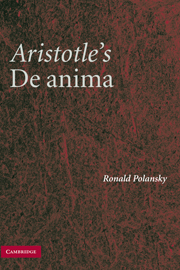Book contents
- Frontmatter
- Contents
- Preface
- List of Abbreviations
- Introduction
- COMMENTARY ON DE ANIMA: : Book 1
- COMMENTARY ON DE ANIMA: Book 2
- COMMENTARY ON DE ANIMA: Book 3
- 1 In the World As It Is There Can Be but the Five Senses
- 2 What Allows for Perceiving That We Perceive; Sense Joins in a Common Power so That the Five Senses Are Subfaculties of a Central Sense Faculty
- 3 Distinguishing Sense and Thought; What Is Phantasia?
- 4 What Is Mind as That Capable of Thinking All Things
- 5 What Enables Thinking to Occur
- 6 The Sorts of Intelligible Objects
- 7 Phantasia Has a Role in All Thinking
- 8 That Mind Can Think All Things
- 9 There Is a Capacity for Progressive Motion
- 10 The Desiderative Capacity Is the Primary Cause of Progressive Motion
- 11 Even the Simplest Animals Have Indefinite Phantasia, and Calculative Phantasia Fits the Account of Progressive Motion
- 12 The Necessary Order of the Faculties of Soul
- 13 The Sort of Body Requisite to Support the Order of the Faculties of Soul
- Bibliography
- Index
7 - Phantasia Has a Role in All Thinking
Published online by Cambridge University Press: 18 December 2009
- Frontmatter
- Contents
- Preface
- List of Abbreviations
- Introduction
- COMMENTARY ON DE ANIMA: : Book 1
- COMMENTARY ON DE ANIMA: Book 2
- COMMENTARY ON DE ANIMA: Book 3
- 1 In the World As It Is There Can Be but the Five Senses
- 2 What Allows for Perceiving That We Perceive; Sense Joins in a Common Power so That the Five Senses Are Subfaculties of a Central Sense Faculty
- 3 Distinguishing Sense and Thought; What Is Phantasia?
- 4 What Is Mind as That Capable of Thinking All Things
- 5 What Enables Thinking to Occur
- 6 The Sorts of Intelligible Objects
- 7 Phantasia Has a Role in All Thinking
- 8 That Mind Can Think All Things
- 9 There Is a Capacity for Progressive Motion
- 10 The Desiderative Capacity Is the Primary Cause of Progressive Motion
- 11 Even the Simplest Animals Have Indefinite Phantasia, and Calculative Phantasia Fits the Account of Progressive Motion
- 12 The Necessary Order of the Faculties of Soul
- 13 The Sort of Body Requisite to Support the Order of the Faculties of Soul
- Bibliography
- Index
Summary
Having traced mind's essence, operation, and objects, Aristotle needs to give more attention to thinking's initiation. Possession of knowledge puts universals in the soul that provide for thinking at wish. But what can provoke such wish, and in general how does dispositional knowledge lead to actual thinking? This is the role of phantasmata. This has been hinted at previously (see 403a8–10, 427b16, and perhaps 430a24–25), but he now needs to offer fuller consideration. He should not merely resort to phantasmata as a desperate assumption but argue for their role in thinking. In this chapter Aristotle begins with an obvious case, practical thinking and its initiation by phantasia, and then goes on to other types of intellect. His guide is the way sense perception of the pleasant or painful causes desire and pursuit or avoidance. As sense has desire and motion concatenated with it, so practical thinking has phantasmata, desire, and action linking with it. He then expands upon this case by further comparison of mind with sense. If sense is a unity, because (1) the action on the medium affects the sense and causes desire and pursuit or avoidance and (2) the five senses lead to a central sense and thus are subfaculties of the sense faculty, mind also is a unity requiring phantasmata along with its thinking and the mind is composed of subfaculties for practical thinking, theoretical thinking, and mathematical thinking. What applies to practical thinking will apply analogously to these other sorts of thinking.
- Type
- Chapter
- Information
- Aristotle's De AnimaA Critical Commentary, pp. 481 - 493Publisher: Cambridge University PressPrint publication year: 2007



